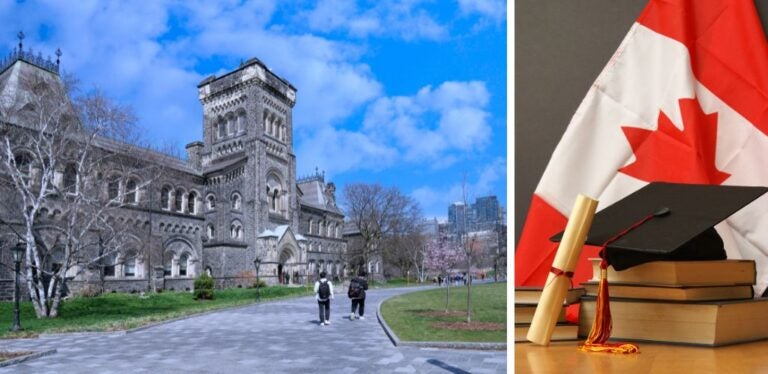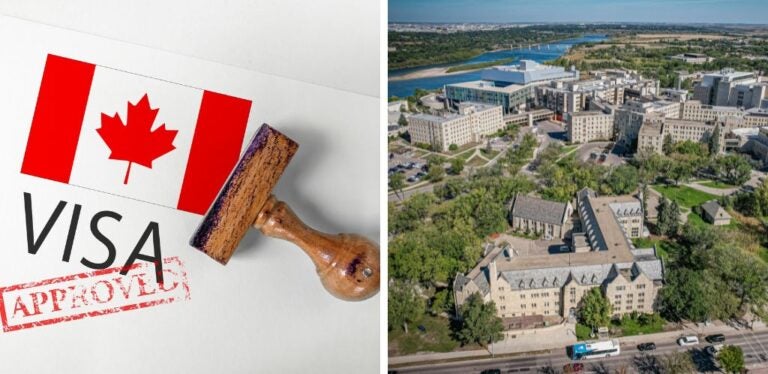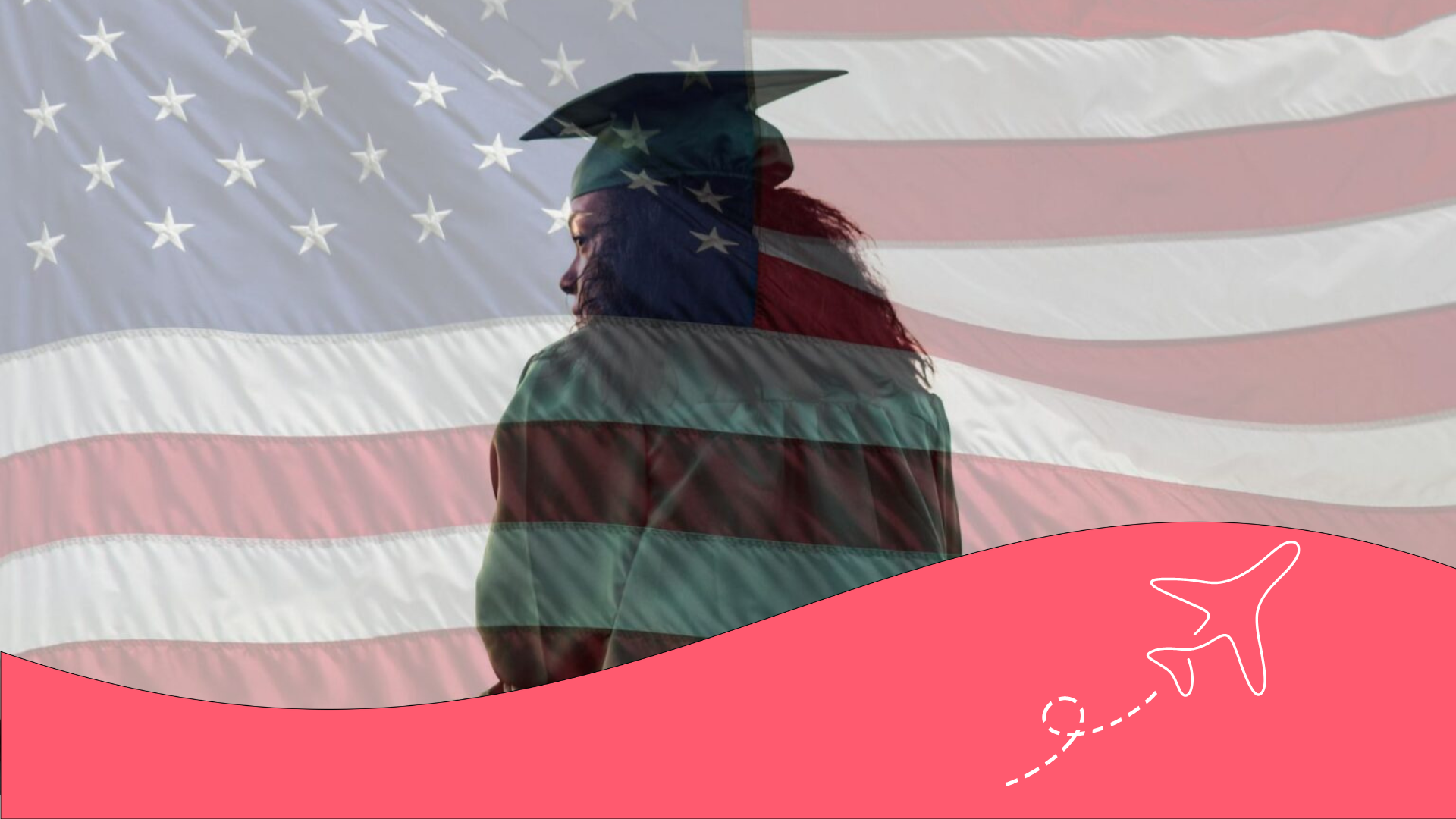How to study in Canada as an international student?
Wondering how to study in Canada as a foreigner? Find out if you need a visa, how much it will cost and the requirements.
Check any international survey or ranking, and you’ll see Canada consistently ranks as the number one choice for studying abroad. Along with top-tier institutions and an exceptional quality of life, it’s known for being especially welcoming to international students. So, how can you study in Canada as a foreign student? What language are classes taught in? And what steps do you need to take to get accepted?
If you’re dreaming of studying in the land of maple leaves but aren’t sure where to start, you’re in the right place. We’ve put together a helpful guide to get you on track. We’ll walk you through what you need to study in Canada, what costs to expect, and even how to handle the big move. Let’s get started so you can begin planning your journey today.
How does the education system work in Canada?
Before diving in and applying to a school, it’s important to understand how the country’s education system works. It’ll give you a clearer picture of what to expect and help you navigate the process more smoothly.
What really sets Canada’s education system apart—besides its high quality—is its hands-on, practical approach. It’s structured across several levels: first, the mandatory stages of primary and secondary school. After that comes post-secondary education, which falls into two main categories: colleges and universities. At universities, you can pursue undergraduate, graduate, and doctoral programs, offered in both English and French.
Another standout feature of Canada’s education system is its flexibility. It’s designed to align closely with job market demands. For instance, colleges typically focus on hands-on training and shorter programs aimed at preparing students for the workforce. Universities, on the other hand, emphasize research and theory, allowing students to dive deeper into their chosen fields of study.
| Level of education | Duration | Description | Languages of study |
| Primary and secondary education | 12-13 years | Compulsory education until approximately 16 or 18 years of age, depending on the province. | English and French |
| College or technical training | 1-3 years | Programs aimed at practical training and job placement, leading to diplomas or certificates. | English and, in some options, French |
| Bachelor’s degree | 3-4 years | Theoretical and practical programs that prepare students for the job market or graduate studies. | English and/or French |
| Master’s Degree (Postgraduate) | 1-2 years | Advanced studies that allow specialization in a specific area, combining theory and practice. | English and/or French |
| Doctorate (PhD) | 3-5 years | Advanced research programs that deepen knowledge of a discipline and encourage innovation. | Mostly in English; some options in French |
Requirements to study abroad in Canada
Just like studying in any other country, getting accepted into a school in Canada isn’t the only step. There are several requirements you’ll need to meet. Knowing them from the start will give you a clearer picture of the process and help you avoid surprises down the line. While each university or institution sets its own specific criteria, here’s a general overview of what most international students need to have:
- Letter of acceptance: First things first—you’ll need to be accepted into a university or college. That means submitting your application on time and meeting the specific requirements set by the institution.
- Student Visa (Study Permit): If your program is longer than six months, you will need to apply for a Study Permit. The process can take from 4 to 12 weeks.
- Valid passport: Even if you’d only be visiting for a few days, you’d still need one—but if you’re planning to stay for a while, make sure your passport is valid for your entire time in Canada. Some institutions even recommend that it remains valid for at least six months beyond the end of your program.
- Proof of language: Given that the programs are in English or French, you may be asked to take exams such as IELTS, TOEFL, or TEF.
- Medical insurance: Canada doesn’t provide free healthcare for international students. In most provinces, you’ll need to arrange private health insurance before you travel. Check out our post on health insurance for international students in Canada to get an idea of the costs and find a plan that fits your needs.
- Justification of funds: To get approved for a student visa, you’ll need to show that you have enough financial resources to support yourself during your stay. Currently, the minimum required for living expenses is CAD $20,635 (USD $15,100) per year—tuition not included. You can prove this with bank statements, scholarship awards, or sponsorship letters.
- Payment of tuition fees: Some universities require an upfront payment to secure your spot. The amount depends on the program, but it typically ranges from CAD $1,000 to $5,000 (USD $730 to $3,650).
Keep in mind these are just the general requirements. Each school may have its own additional criteria, so be sure to check their website for the specific details.

Steps to study in Canada for international students
Now that you’re familiar with how Canada’s education system works and what the basic requirements are, it’s time to look at the actual process. Studying in Canada is a big step, and there’s quite a bit to take care of before you find yourself in a classroom at one of its renowned institutions. Knowing what to expect at each stage will help you get organized and set yourself up for success. Here’s what you’ll need to do before your studies begin:
1. Evaluate universities and courses in Canada
Where do you want to study? That’s the first big decision you’ll need to make. Canada is home to some of the world’s top universities, like the University of Toronto, the University of British Columbia, and McGill University. It also has colleges that focus more on hands-on, career-oriented programs—great if you’re looking for practical training geared toward the job market. Not sure which path suits you best? Check out this comparison table to see the key differences between the two options.
| Category | University studies | Short courses |
| Duration | Long programs: 3-4 years for bachelor’s degrees, 1-2 years for master’s degrees. | Intensive training from weeks to months, focused on specific skills. |
| Cost | High annual tuition for international students, with scholarship and financing options. | Generally more affordable, though fewer scholarship options. |
| Languages available | Mainly in English and French, with some bilingual programs. | High availability in English, with some specific courses in French. |
| Main objective | In-depth academic training, with the possibility of specialization and access to research. | Development of practical skills to improve the professional profile without the need for a full university degree. |
| Entry requirements | More demanding: previous degrees, English tests (IELTS, TOEFL), approvals and extensive documentation. | More accessible: In many cases, they only require previous experience or intermediate English certification. |
| Flexibility | Rigid structure with fixed schedules, face-to-face or hybrid modality. | Greater flexibility: On-site, online and intensive options to combine with work or other studies. |
| Professional opportunities | Access to jobs in international companies, research and highly specialized sectors. | Fast-track option to improve skills, change sectors or increase employability |
It’s a big decision, so take your time to choose wisely. Look at international rankings, read reviews on forums and in education magazines—anything that gives you insight into the schools. If you can, attend education fairs to gather more info. Reaching out to current students at the institutions you’re considering can also be a great way to get honest feedback and clear up any doubts.
2. Review financing options for studying in Canada
Already decided what and where you want to study? Then it’s time to think about how you’re going to pay for it. Studying in Canada isn’t cheap—a bachelor’s degree can cost between CAD $20,000 and $40,000 per year (USD $14,600 to $29,300). Graduate programs? Those can go over CAD $50,000 (USD $36,600) annually. If covering the cost is a concern, don’t worry—there are financial aid options available to help ease the burden. Here are a few to consider:
- Scholarships to study in Canada: The Canadian government and many universities offer scholarship programs, like the Vanier Canada Graduate Scholarships or each school’s own International Student Awards.
- Student loans: While international students aren’t eligible for government student loans like Canadian citizens are, some private financial institutions do offer funding options.
- Private funds and sponsorships: There are also international organizations and companies that offer partial funding for students in key fields like engineering, technology, and research.
If you’re planning to apply for any of these options, it’s best to decide early and start the process as soon as possible—it can take time. Check the universities’ websites for application dates and visit the Canadian government’s portal to stay up to date on current opportunities.
3. Applying to a study program in Canada
Once you’ve chosen the school you want to attend, it’s time to start the application process. In Canada you apply directly to each institution, and most schools have their own online application system. While requirements can vary, you’ll likely need the following to complete your application:
- Cover letter: Document in which you explain why you want to study in that program and how it aligns with your academic and professional goals.
- Certificates of previous studies: Must be translated into English or French and, in some cases, certified according to Canadian criteria.
- Language test: If the program is in English, you will probably need to submit the IELTS, TOEFL. For programs in French, you may be asked to submit the TEF or DALF.
- Recommendation letters: Some universities, especially in graduate programs, ask for academic or professional references.
- Application fees: Many universities charge an administrative fee for processing the application, which usually ranges from CAD $100 to $250 (USD $73 to $183).
Keep an eye on application deadlines—they vary by university and program, but most fall between January and March. Make sure to double-check the dates and submit your application well in advance.
4. Applying for a visa to study in Canada
Another important thing to keep in mind: you’ll need to apply for a Canadian student visa. Many schools offer support through their international student services offices, but they don’t handle the application for you—you’ll need to go through Immigration, Refugees and Citizenship Canada (IRCC). There are different types of permits, and the one you’ll need depends on the program you’re enrolling in.
- Study Permit: This is the permit required for international students enrolled in full-time programs. You’ll need an official letter of acceptance from a recognized Canadian institution to apply.
- Temporary Resident Visa: In some cases, if the course lasts less than six months, you can study on a visitor’s visa without a study permit.
- Work & Study Permit: Some programs allow you to study and work at the same time. This permit lets you work up to 20 hours per week during the academic term, and full-time during scheduled breaks.
When you apply for your student visa, you’ll need to provide your letter of acceptance, proof that you have enough funds to cover your studies, and the payment receipt for the application fee, which is CAD $150 (USD $110). The process can take anywhere from 4 to 12 weeks, so don’t wait until the last minute—get started early.

5. Moving to Canada
Now comes one of the most exciting parts! Once all the paperwork is sorted, it’s time to get ready for your new life. What should you keep in mind? Planning ahead will make your move a whole lot smoother. Here are a few things you’ll want to figure out:
- Accommodation: Rent can be pretty high in cities like Toronto and Vancouver. A one-bedroom apartment downtown might run you between CAD $1,500 and $2,500 (USD $1,100–$1,830) per month. If you look farther from the city center, prices can drop to around CAD $1,200 (USD $880). Sites like Rentals.ca or Zumper are great places to start your search for a new home in Canada.
- Transportation: Canada has a reliable public transportation system, especially in cities like Toronto and Montreal, where trains and buses are the go-to options. Students can take advantage of discounted fares with cards like the Presto Card in Toronto or the OPUS Card in Montreal.
- Local customs: There are a few cultural quirks that might catch you off guard—like meal times, for instance. Lunch is usually light and eaten around noon, and dinner tends to be on the early side, typically between 6 and 7 pm.
Before you board your flight, make sure you’ve got all your key documents easily accessible—your visa, admission letter, and proof of accommodation. Having everything in order will make your arrival much smoother.
6. Connectivity in Canada
And while we’re going over everything you need to prepare for your move to Canada, we can’t forget about staying connected. How will you get internet access once you arrive? Sorting this out ahead of time will make it much easier to handle paperwork, find your way around, and get in touch with your university.
To stay connected from the moment you land, we recommend Holafly Plans. You won’t have to waste time hunting for a local SIM card or relying on public Wi-Fi while you’re handling all the logistics of settling into a new country.
This service offers a range of plans, so you can choose the one that best fits how much data you think you’ll need while studying in Canada. And if your needs change later on, no worries—you can switch or cancel anytime. Here’s a look at the available options:
- 10 GB plan: It will be useful for basic tasks, such as navigation, emails and maps. Its monthly cost is 39.90 euros ($40.93).
- 25 GB plan: You will be able to make video calls with your family and access university platforms. It is priced at 49.90 euros ($51.19) per month.
- Unlimited plan: A suitable option for those who need to ensure that their connection is constant and also want to use it on several devices. Its rate is 64.90 euros ($67.90) per month.
Important: If you are a frequent traveler and want to stay connected without worrying about expensive roaming or looking for a new SIM at every destination, Holafly’s subscription plans are for you. With a single eSIM, enjoy internet in more than 170 countries for a fixed price and no surprises on your bill. Travel without limits and connect easily and securely! 🚀🌍

When and how to homologate degrees and courses in Canada?
Chances are, if you’re applying for a degree or postgraduate program, the university will ask you to get your academic credentials officially recognized. It’s the only way they’ll count within the Canadian education system. So, what will you need to make that happen?
- Certified copy of the academic degree obtained in your country.
- Transcripts translated into English or French, with details of the subjects taken and credits earned.
- Description of the program of studies, including time load and content of the subjects.
- Valid passport or identity card.
- Proof of proficiency in English or French (IELTS, TOEFL, TEF, DALF) if required by the institution.
In Canada, the organization that handles credential evaluation depends on the province. The main agencies for this process are World Education Services (WES) and the International Credential Evaluation Service (ICES). That said, some universities also have their own internal systems for validating foreign qualifications.
How much will it cost? That depends on who’s handling the process and the level of your studies. If you go through WES, expect to pay between CAD $200 and $350 (USD $150 to $260). Keep in mind there might be extra fees for certified translations or admin costs.
If your university admission depends on getting your degree recognized, don’t wait until the last minute—these evaluations can take anywhere from six weeks to three months.
How much does it cost to study abroad in Canada?
Now that you’ve got a clear picture of everything you need to sort out to study in Canada, let’s talk money. Your monthly expenses will depend a lot on where you live, the kind of school you attend, and your lifestyle. Here’s a rough idea of average costs to help you plan ahead:
| Concept | Cost in CAD ($) | Cost in USD ($) |
| University tuition (undergraduate) | 20,000-40,000 per year | 14,600-29,300 per year |
| University tuition (postgraduate) | 22,000-50,000 per year | 16,000-36,600 per year |
| Short courses and certifications | 5,000-15,000 depending on duration | 3,700-11,000 depending on duration |
| Accommodation (room in a shared apartment) | 800-1,800 per month | 580-1,320 per month |
| Transportation (monthly public transport card) | 100-200 per month | 73-150 per month |
| Meals | 300-600 per month | 220-440 per month |
| Medical insurance (compulsory for international students) | 50-80 per month | 36-58 per month |
| Study materials and other expenses | 100-250 per month | 73-183 per month |
| Estimated monthly total (without tuition) | 1,350-2,930 | 980-2,100 |
Study online in Canada as a foreigner
Want to study at a top Canadian university without leaving home? You can. Canada offers a wide range of online programs — from undergraduate and graduate degrees to professional certificates — at prestigious institutions like the University of Toronto, UBC, and McGill.
It’s a great way to earn a Canadian education without relocating. You’ll save on housing and living costs, enjoy more flexibility with your schedule, and skip the hassle of getting a student visa — all while studying at a top university. That said, online learning comes with its own challenges. It demands strong self-discipline and offers less face-to-face interaction with professors and classmates.
What are the options to study online in Canada?
Several universities and institutions offer distance learning programs. Some of the most popular are:
- Athabasca University: Specializing in online education, with undergraduate and graduate programs in a variety of areas.
- University of Toronto School of Continuing Studies: Virtual courses in business, technology and humanities.
- McGill University: Distance learning options in management, health and law.
- University of British Columbia Extended Learning: Certificate programs in management, science and education.
You can also access complementary training through platforms such as Coursera and edX, which collaborate with Canadian universities to offer certificate courses.
Admission requirements are usually similar to those for on-campus programs. You’ll likely need to submit translated academic transcripts, proof of language proficiency (like IELTS or TOEFL), and a statement of purpose.
Frequently asked questions about studying in Canada as a foreigner
It depends on the program and the university. Many schools offer courses in English, but in provinces like Quebec, there’s also a strong selection of programs in French. For English-language programs, you’ll probably need to prove your level with tests like IELTS or TOEFL. For French programs, exams like the TEF or DALF are usually required.
Costs vary depending on the university and the program. For international students, undergraduate tuition typically ranges from CAD $20,000 to $40,000 (USD $14,600 to $29,300) per year. On top of that, you’ll need to factor in living expenses, which can differ significantly depending on the city you choose to live in.
Yes, if you’re studying remotely from your home country, you won’t need a student visa. But if you plan to move to Canada for an in-person or hybrid program, you’ll need to apply for a Study Permit.
Some universities offer hybrid programs that mix online classes with in-person sessions. If that’s the case, make sure to check the school’s specific requirements—you may need a Study Permit if you’re required to travel to Canada for part of the course.
Yes, as long as an accredited Canadian institution offers the program. Schools like Athabasca University, the University of Toronto, and McGill offer remote programs with recognized degrees. Just make sure to check whether the diploma will be valid in the country where you plan to work or continue your studies.





 Language
Language 


















 No results found
No results found








